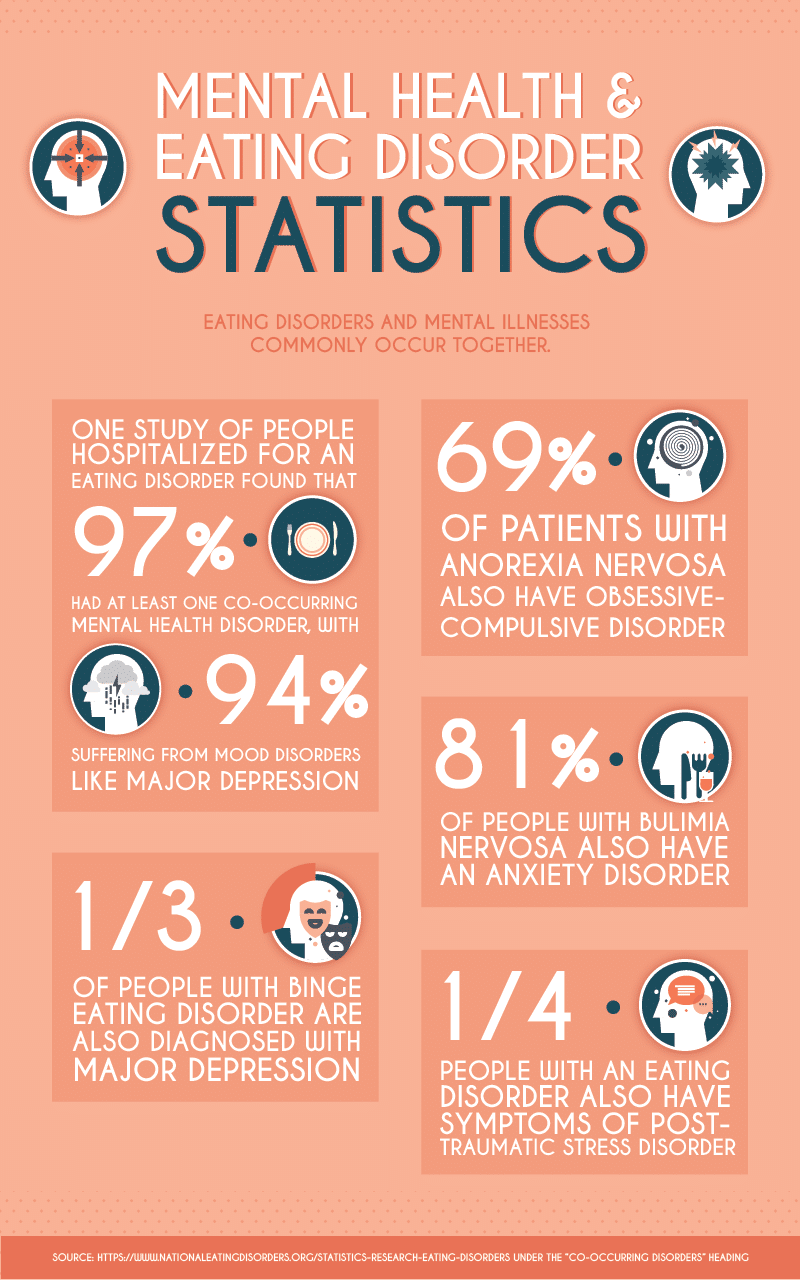Eating disorder statistics regularly show the prevalence of co-occurring mental health issues among those with eating disorders. In fact, eating disorders often develop as coping mechanisms for conditions like depression, anxiety, and trauma. However, how tight is the link between eating disorders and other mental health problems?
Anorexia
Anorexia itself is relatively common and is actually the third most common chronic illness among young adults. In fact, up to 2% of women meet the criteria for an anorexia diagnosis at some point in their lives.
Eating disorder statistics show that anorexia frequently co-occurs with some type of psychiatric disorder. In fact, around 56% of those with anorexia have at least one other mental illness. One study found that over a third of those with a diagnosis also have major depressive disorder. In addition, up to half of the people with anorexia also have an anxiety disorder.
Bulimia
Bulimia may be even more prevalent than anorexia, with almost 5% of women developing the disorder. Up to 95% of bulimics have a co-occurring psychiatric disorder. Anxiety disorders are most common among those with bulimia, with up to 85% of sufferers having that particular dual diagnosis.
A third of bulimia patients also suffer from obsessive-compulsive disorder. In fact, obsessive-compulsive traits in children are often good predictors for the development of eating disorders later on.
Binge Eating Disorder
Eating disorder statistics show that around 4% of women will develop binge eating disorder during their lifetime. In fact, this disorder is more than three times more prevalent among the general population than anorexia and bulimia combined.
79% of people with binge eating disorder also have another psychiatric issue. Almost one-third of sufferers also struggle with a personality disorder, with the most common being obsessive-compulsive and borderline personality disorders. Over half of those with binge eating disorder deal with some form of anxiety disorder.
Dual Diagnosis Treatment
With the prevalence of co-occurring conditions that the above eating disorder statistics indicate, clinicians must address them during treatment. Not to do so would be a disservice. For this reason, the best options for eating disorder therapy in Alabama offer dual diagnosis and mental health treatment.
This form of treatment addresses any co-occurring condition in addition to the eating disorder. Conditions that occur alongside eating disorders include a wide variety of diagnoses, including:
- Depression
- Anxiety
- Post-traumatic stress disorder
- Obsessive-compulsive disorder
- Substance abuse
- Personality disorders
- Self-harm
To achieve true healing, treatment must address all challenges a woman faces.
Don’t Be Scared By Eating Disorder Statistics
There’s a significant stigma around mental health, including eating disorders. For this reason, reading the above eating disorder statistics may be intimidating for anyone battling any of these issues. However, they should also make you feel less alone. Women with these issues find healing and recovery every day, and that’s an option for you too. To learn more about our comprehensive eating disorder treatment programs in Alabama, reach out to Magnolia Creek at 205-409-4220.




